It's all about the classical music composers and their works from the last 400 years and much more about music. Hier erfahren Sie alles über die klassischen Komponisten und ihre Meisterwerke der letzten vierhundert Jahre und vieles mehr über Klassische Musik.
Total Pageviews
Tuesday, September 24, 2013
24 Weird and Wonderful Classical Music Tattoos
Wednesday, September 11, 2013
Anton Dvorak - His Music and His Life
Born:
Died:
Dvorak Quick Facts:
- Johannes Brahms once wrote a letter praising and exulting Dvorak’s music; they later became great friends.
- After moving to America in 1892, Dvorak spent his summer vacation in the small town of Spillville, Iowa in 1893, because of it’s mainly Czech population.
- Dvorak’s greatest musical success was achieved by the world premier of his New World Symphony in Carnegie Hall on December 3, 1893.
Dvorak's Family Background:
Childhood Years:
Teenage Years:
Early Adult Years:
Mid Adult Years:
Late Adult Years:
Selected Works by Dvorak:
- Symphony No. 1, c minor - 1865
- Symphony No. 2, B flat Major - 1865
- Symphony No. 3, E flat Major - 1873
- Symphony No. 4, d minor - 1874
- Symphony No. 5, F Major - 1875
- Symphony No. 6, D Major - 1880
- Symphony No. 7, d minor - 1885
- Symphony No. 8, G Major - 1889
- Symphony No. 9, New World Symphony, e minor - 1893
- Mass in D Major - 1887
- Te Deum - 1892
- Requiem - 1890
Thursday, September 5, 2013
Gaetano Donizetti - His Music and his Life
Wednesday, August 28, 2013
Claude Debussy - His Music and His Life
Claude Debussy was born into a poor family in France on August 22, 1862, but his obvious gift at the piano sent him to the Paris Conservatory at age 11. At age 22, he won the Prix de Rome, which financed two years of further musical study in the Italian capital. After the turn of the century, Debussy established himself as the leading figure of French music. During World War I, while Paris was being bombed by the German air force, he succumbed to colon cancer at the age of 55.
In 1884, when he was just 22 years old, Debussy entered his cantata L'Enfant prodigue (The Prodigal Son) in the Prix de Rome, a competition for composers. He took home the top prize, which allowed him to study for two years in the Italian capital. While there, he studied the music of German composer Richard Wagner, specifically his opera Tristan und Isolde. Wagner’s influence on Debussy was profound and lasting, but despite this, Debussy generally shied away from the ostentation of Wagner’s opera in his own works.
Debussy returned to Paris in 1887 and attended the Paris World Exhibition two years later. There he heard a Javanese gamelan—a musical ensemble composed of a variety of bells, gongs and xylophones, sometimes accompanied by vocals—and the subsequent years found Debussy incorporating the elements of the gamelan into his existing style to produce a wholly new kind of sound.
Friday, August 23, 2013
Arcangelo Corelli - His Music and His Life
Corelli developed Concerto Grosso into a form of secular entertainment for the aristocracy. He used the idea of a musical competition between two groups of musicians during the Concerto. A smaller group has only two violins and a cello, while the larger group is the full orchestra. At the beginning of concerto each group presents their beautiful theme with arrangements. During the course of the concerto both groups develop musical interaction and their melody lines become intertwined until they reach mutual culmination in the climax of the grand finale.
Corelli was a highly reputable teacher of music and composition. Besides giving music lessons to his aristocratic patrons, he taught such composers as Francesco Geminiani and Pietro Locatelli. His strong influence was recognized by Antonio Vivaldi who became Corelli's successor at the palace of Cardinal Ottoboni. Johann Sebastian Bach studied Corelli's compositions. A remarkable tribute to Corelli was made by Serge Rachmaninoff in his concerto for piano and orchestra titled 'Rhapsody on a theme of Corelli' (aka.. Corelli Variations, Opus 42,1931).
Arcangelo Corelli died on January 8, 1713, in Rome and was laid to rest in the Pantheon of Rome.
Corelli's Concerti Grossi may be heard in film soundtracks as well as in numerous recordings of the Baroque music and in live concert performances.
Sunday, August 18, 2013
Domenico Cimarosa - His Music and His Life
Saturday, August 10, 2013
Luigi Cherubini - His Music and His Life
Tuesday, July 23, 2013
Anton Brucker - His Music and His Life
The premiere of Bruckner's 9th symphony was 1903 (after his death on October 11, 1896 in Vienna), "dedicated to our Beloved Lord".
“It is to God that I must give account”
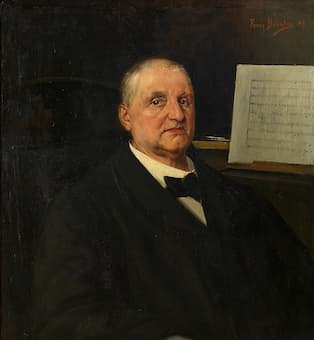
Anton Bruckner, 1889
125 years ago, on 11 October 1896, Anton Bruckner (1824-1896) died from acute heart disease brought on by persistent alcoholism. His funeral took place in the Karlskirche in Vienna on 14 October, and his remains were transferred to the crypt in the monastery of St. Florian near Linz, Austria. Even after his death, Bruckner took center stage in the cultural wars of late 19th-century Vienna. “Admirers described him as an unpretentious, modest man and a daring innovator who shied away from no enterprise.” While his detractors did recognize his originality, “they found nothing of value in the work of a modest Viennese church musician who lived a solitary dreamlike existence without ambition and who had been dragged into the limelight by an excessive Wagnerian cult.” Today, Bruckner is primarily remembered for his symphonies and sacred compositions, and as the “master-builder of cathedrals in sound,” we recognize him as a composer having exerted a lasting and crucial influence on the works of Gustav Mahler. Son of a schoolmaster and church organist, Bruckner was born in the village of Ansfelden—near the city of Linz—on 4 September 1824. The eldest of 11 children, he was admitted to the Augustinian monastery of St. Florian as a chorister, where he participated in its rich musical activities.
St. Florian not only imparted a solid musical education, it also firmly established his devotion to Roman Catholicism. Throughout his life, Bruckner was a devoutly religious man who kept a log of his daily devotions, and prayed before each performance. He is even thought to have experienced religious visions. It is said “there is no composer in the 19th century who was rooted so firmly in a lived, heart-deep devoutness, to whom prayer, confession, sacrament, and profession were vital elements.” His faith in the spiritual journey towards the afterlife became a process that decisively shaped his compositional imagination as he channeled profound spiritual messages that elevated music to the level of an undistracted prayer. His initial career path, however, had nothing to do with music, as he became a teaching assistant in Windhaag near Freistadt. An additional teaching appointment saw him at Kronstorf an der Enns, but eventually he returned to St. Florian for 10 years to work as a teacher and an organist.
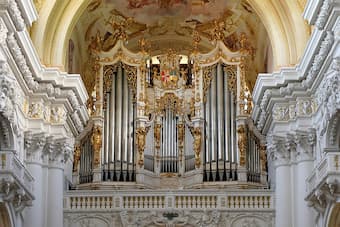
St. Florian Monastery Bruckner Organ
As a composer, Bruckner was largely self-taught and only started to composing seriously at age 37. He took composition lessons from the German cellist and conductor Otto Kitzler, who introduced him to the music of Richard Wagner. He also became a student of the famous Vienna music theorist Simon Sechter, who instructed him in music theory and counterpoint.
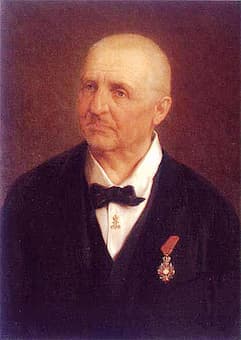
Anton Bruckner
When Sechter died in 1868, Bruckner reluctantly took up the appointment of professor of harmony and counterpoint at the Vienna Conservatory, and subsequently as the Emperor’s court organist. His complete admiration for Richard Wagner elicited deep-seated resentment within Vienna’s musical and critical circles, and for a while, the Vienna Philharmonic Orchestra refused to perform his works. Habitually plagued by debilitating periods of low self-esteem, Bruckner was ill prepared for the acidic and highly competitive musical environment of imperial Vienna. He presented a wide and easy target for music critics, journalists and composers alike. Bruckner’s highly idiosyncratic and expansive musical style was mercilessly criticized, with a critic claiming, “Bruckner simply composes like a drunkard!”
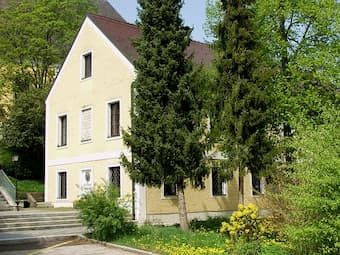
Anton-Bruckner-Museum
Given such harsh professional assessments, it is not surprising that Bruckner was prone to suffer from devastating insecurities that made him endlessly revise and correct his compositions. He allowed outside influences to shape the content of his music and relied for editorial assistance on a number of former students. Their “authorized” involvement with his scores has become one the thorniest issues to haunt the composer’s legacy. Bruckner never felt at home in Vienna. He retained his peasant speech and social clumsiness throughout, and had the disastrous inclination to fall in love with teenage girls. His distracting compulsions ranged from obsessive preoccupation with financial security to a morbid fascination with corpses. Bruckner was painfully unaware of the intellectual and political currents of his day, and he exhibited a “Neanderthal male chauvinism that even his admirers found remarkable.”
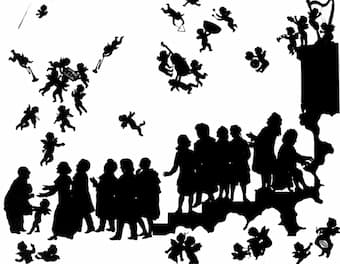
Otto Böhler: Anton Bruckner arrives in heaven
Bruckner composed music that was simultaneously naïve and complex. Yet, once he had found his compositional path, the musical world did not know what to do with it. The conductor Wilhelm Furtwängler pointedly stated, “Bruckner did not work for the present. In his art he thought only of eternity and he created for eternity. In this way he became the most misunderstood of the great musicians… Bruckner is one of those geniuses who have appeared but seldom in the course of European history, whose destiny it was to render the transcendent real and to attract, even to compel, the element of the divine into our human world.”
Ferruccio Busoni - His Music and His Life (II)
Monday, July 22, 2013
Ferruccio Busoni - His Music and His Life
(To be continued!)
Friday, July 12, 2013
Max Bruch - His Music and His Life
Saturday, July 6, 2013
Francois Adrien Boildieu - His Music and His Life
Friday, July 5, 2013
Leo Blech - His Music and His Life
In 1925 in Vienna State Opera, then in Berlin 1936-1941, Riga in Lativa, then Stockholm in Sweden - what a career and what a fulfilled life for Leo Blech, who was known for his reliable, dear and elegant performances and for his sensitivity as an accompanist.
Besides apt and practical children's songs, Blech's comic operas deserved sympathy: "Das war ich" (That was me, 1902) and "Versiegelt" (Sealed, 1908).
Leo Blech passed away in Berlin on August 24, 1958.
Friday, June 28, 2013
The Magic of the Stradivarius
The Alard Stradivarius
Monday, June 10, 2013
Eugen d'Albert - His Music and Life
"The Concerto for Piano in e-major" from 1893. Out of 21 operas the following pieces are more then remarkable: "Die Abreise" (The departure, 1898), "Die toten Augen" (The dead eyes, 1916), and most especially "Tiefland" (The Plain, 1903).














